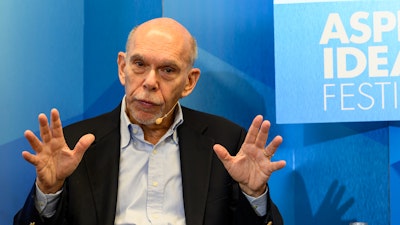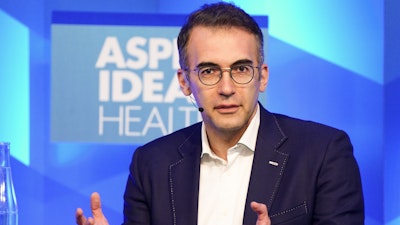Kenneth Davis is executive vice chair of the Board of Trustees of the Mount Sinai Health System. Prior to this, he was CEO of Mount Sinai, which includes the Icahn School of Medicine. Davis is a leader in the move away from fee-for-service medicine to population health to keep people healthy and out of the hospital. A neurobiologist, he conducted research that led to FDA approval of four of the first five drugs for treating Alzheimer’s disease. Davis is an elected member of the National Academy of Sciences’ Institute of Medicine and a frequently cited researcher in the field of brain diseases. His honors include the George H. W. Bush Lifetime of Leadership Award from Yale University. Davis is a trustee of the Aspen Institute. (Mount Sinai is a 2024 Festival Underwriter)
Previously

Brain-computer interfaces show potential to restore function to people impacted by incurable neurological conditions such as stroke, spinal cord injury, traumatic brain injury...

Health systems are joining hands, swallowing up competitors, acquiring new practices, and growing bigger. Like it or fear it, a tidal wave of consolidation is rocking healthca...

The mysteries of brain health are hidden deep within the ridges and grooves of the cerebral cortex. Join Mount Sinai Health System neuroscientists in this discussion of new te...

Remarkable screening and diagnostic tools are being developed so that disease can be identified in its earliest stages, when it is most treatable, and disease subtypes can be...

The high cost of health care is a burden on American families. Despite its excellence in many places in clinical care, research, and innovation, the US health care system is m...

New insights into human biology and the ability to manipulate molecules both large and small are rapidly accelerating medical innovations. By employing genetic engineering to...


If we are lucky enough to reach age 85, we face a 25 percent chance of dementia, and the odds worsen with time. Some 50 million people worldwide were living with dementia in 2...

While the politics of gun reform remain divisive, many Americans are convinced that when it comes to gun violence, something has to change. Whether it’s getting more data abou...

Medical and technological breakthroughs, cultural and demographic upheaval, policy changes, and financial realities virtually guarantee that the health care system of tomorrow...

The world of health care, and how to deliver it, is a constant topic for headlines. Beyond congressional wrangling over the next iterations of public policy, however, what pre...

Many health systems are retooling to provide “patient-centered care,” defined by the Institute of Medicine as a partnership between providers and patients that respects indivi...

A lot of the discussion about the Affordable Care Act in the lead-up to the election is focused backward. How well has it worked? What’s changed in the past six years? What we...

The average annual cost of cancer drugs in the US now exceeds $100,000 and the price of more than 200 generic drugs doubled from 2013 to 2014. That puts them far out of reach...

Medicine is being disrupted from every angle, as the financing and organization of clinical care are overhauled and scientific knowledge grows increasingly sophisticated. Aca...


